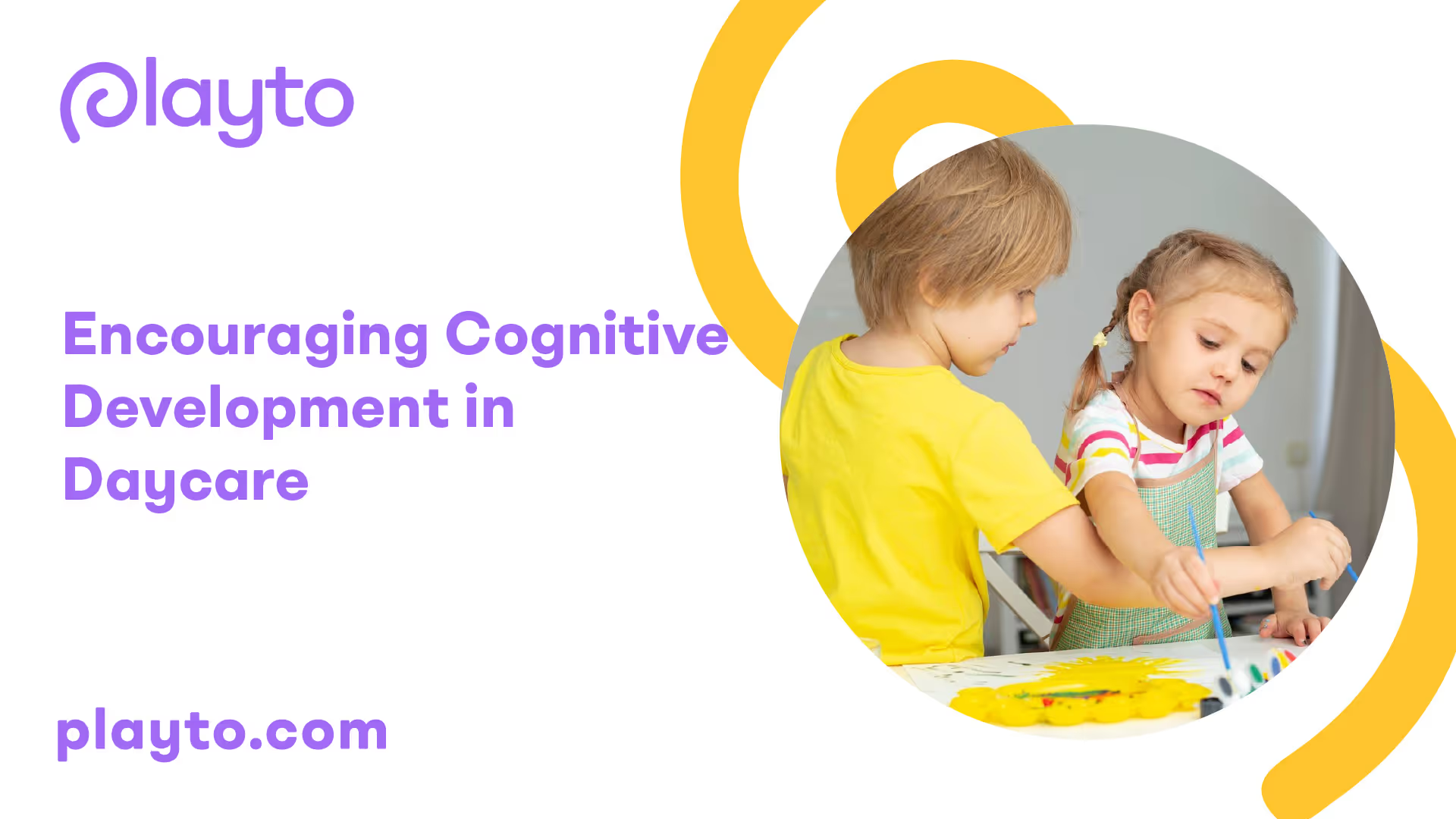
Importance of Cognitive Stimulation
Cognitive stimulation plays a vital role in the development of young children attending daycare centers. The impact of cognitive stimulation on children's growth and learning is significant, influencing their cognitive and neural development. Understanding the importance of cognitive stimulation can help daycare providers create enriching environments that foster cognitive growth and prepare children for future success.
Impact of Cognitive Stimulation
Cognitive stimulation refers to environmental inputs that engage the senses and provide learning opportunities for children. These experiences facilitate the acquisition of knowledge across various cognitive domains, such as language, problem-solving, and memory. Research has shown that increased cognitive stimulation in early childhood promotes the development of essential cognitive skills, including attention, reasoning, and information processing.
By providing stimulating activities and interactions, daycare centers can help children develop essential cognitive abilities. These activities may include puzzles, storytelling, educational games, and age-appropriate learning materials. Engaging children in these activities encourages curiosity, critical thinking, and a love for learning.
Disparities in Stimulation Levels
Unfortunately, there can be disparities in the levels of cognitive stimulation experienced by children attending daycare. Variability in cognitive stimulation is often linked to differences in socioeconomic status, which may result in unequal access to enriching experiences. Children from disadvantaged backgrounds may face limited exposure to cognitive-stimulating activities, which can impact their overall cognitive development [1].
To address these disparities, it is essential for daycare centers to provide equal opportunities for cognitive stimulation to all children. By focusing on creating inclusive and stimulating environments, daycare providers can help bridge the gap and ensure that every child has access to the cognitive stimulation they need for healthy development.
By recognizing the impact of cognitive stimulation and addressing disparities in stimulation levels, daycare centers can play a crucial role in fostering cognitive development in young children. The next sections will explore strategies for providing cognitive stimulation and promoting healthy neural development in daycare settings. Additionally, we will discuss the role of nutrition, play-based learning, and outdoor play in cognitive development. Stay tuned for more insights on encouraging cognitive development in daycare.

Cognitive Stimulation and Neural Development
Cognitive stimulation plays a crucial role in the neural development of children, particularly during their early years. Insufficient cognitive stimulation during this critical period can have lasting consequences for neural development and may impact academic and occupational achievement later in life [1]. Understanding the consequences of low stimulation and implementing intervention strategies is essential for fostering healthy cognitive development in daycare settings.
Lasting Consequences of Low Stimulation
Research suggests that low levels of cognitive stimulation in early life may restrict learning opportunities, leading to long-term effects on neural development. Children who experience limited cognitive stimulation may face challenges in acquiring cognitive skills, language development, problem-solving abilities, and executive functions [1]. These deficits can persist into adolescence and adulthood, affecting academic performance, career prospects, and overall well-being.
Intervention Strategies for Healthy Development
Understanding the profound impact of cognitive stimulation on neural development, it is crucial to implement effective intervention strategies in daycare settings. By providing appropriate cognitive stimulation, educators and caregivers can foster healthy cognitive development in children.
One effective strategy is to create a rich learning environment that promotes cognitive engagement. This can be achieved through a variety of activities, such as age-appropriate puzzles, educational games, storytelling, and interactive play. These activities stimulate children's curiosity, problem-solving skills, and critical thinking abilities.
Additionally, incorporating language-rich interactions is vital for cognitive development. Engaging children in conversations, reading books aloud, and encouraging them to express their thoughts and ideas helps foster language development and enhances cognitive skills. For more information on encouraging language development in daycare, refer to our article on encouraging language development in daycare.
Furthermore, combining nutritional interventions with psychosocial stimulation has shown promising results in improving cognitive functioning in preschool-age children. Providing well-balanced meals and snacks that include a variety of nutrients can support optimal brain development and cognitive growth. Adequate nutrition is crucial for children's overall health and well-being, and it directly impacts cognitive skills and learning abilities. To learn more about the effects of nutrition on cognitive development, refer to our article on nutrition and cognitive development.
By implementing these intervention strategies and promoting cognitive stimulation in daycare settings, educators and caregivers can positively impact the neural development and cognitive abilities of children. Encouraging healthy cognitive development sets a solid foundation for lifelong learning and success.

Cognitive Stimulation and Brain Development
Cognitive stimulation plays a vital role in the development of a child's brain. Defined as environmental inputs that engage the senses and provide learning opportunities, cognitive stimulation influences children's cognitive and neural development across various domains. Understanding the role of cognitive stimulation and its causal link to cognitive development is crucial for creating effective strategies to foster healthy development in daycare settings.
Role of Cognitive Stimulation
Cognitive stimulation in early childhood provides children with the necessary learning experiences that contribute to their cognitive growth. By engaging children in activities that challenge their thinking, problem-solving, and reasoning abilities, cognitive stimulation helps to develop their cognitive skills and knowledge.
In daycare environments, cognitive stimulation can be implemented through various methods, such as interactive games, puzzles, storytelling, and educational activities. These activities encourage children to actively explore and engage with their surroundings, fostering their cognitive development. By providing a stimulating environment enriched with educational materials and opportunities for learning, daycare providers can create a conducive atmosphere for cognitive growth.
Causal Link to Cognitive Development
Research has shown a causal link between cognitive stimulation and cognitive development in children. Low levels of cognitive stimulation during early life can restrict learning opportunities, leading to lasting consequences for neural development and later academic and occupational achievement. Children who experience high levels of cognitive stimulation tend to demonstrate better cognitive skills, including language development, problem-solving abilities, and attention span.
Understanding this causal link is essential for developing effective intervention strategies to foster the healthy development of all children in daycare settings. By providing an environment rich in cognitive stimulation, daycare providers can help unlock the full potential of children and promote their cognitive growth.
To ensure optimal cognitive stimulation, it is important to consider the individual characteristics, family, social, and cultural contexts of each child. Developmentally appropriate teaching practices that align with each child's unique needs and interests can enhance cognitive development in daycare settings. By integrating activities that promote cognitive stimulation into daily routines, daycare providers can create a nurturing and intellectually stimulating environment for children to thrive.
In addition to cognitive stimulation, it is important to consider other aspects of development in daycare, such as language development, emotional development, social development, and physical development. By addressing all these domains, daycare providers can support holistic development and lay a strong foundation for a child's future success.
Nutrition and Cognitive Development
Proper nutrition plays a vital role in the cognitive development of children attending daycare. The food children consume directly impacts their cognitive skills and overall brain function. In this section, we will explore the effects of nutrition on cognitive skills and emphasize the importance of adequate nutrition.
Effects of Nutrition on Cognitive Skills
Research has shown that nutrition has a significant impact on cognitive outcomes in children. In particular, certain nutrients have been found to be crucial for cognitive development. Some key nutrients that play a role in cognitive skills include:
- Omega-3 Fatty Acids: Increased fish consumption, a rich source of omega-3 fatty acids, has been associated with improved cognitive outcomes in nourished children [2].
- Micronutrients: Studies have found that iron and multiple-micronutrient supplementation can lead to improvements in the cognitive abilities of undernourished preschool-age children.
- Vitamin B12, Folic Acid, Choline, Iron, Iodine, and Zinc: These nutrients have been identified as important contributors to cognitive development [4].
It is crucial to ensure that children receive sufficient nutrition during their preschool years to support their cognitive development. Inadequate nutrition can impair cognitive skills and hinder overall cognitive growth. Providing a well-balanced diet that includes a variety of nutrient-rich foods can help optimize cognitive development in daycare.
Importance of Adequate Nutrition
Adequate nutrition is essential for children's cognitive development in daycare. A well-nourished child is more likely to have improved cognitive abilities, including enhanced memory, attention, and problem-solving skills. Conversely, children who do not receive sufficient nutrition are at a higher risk of exhibiting impaired cognitive skills.
To promote healthy cognitive development, daycare centers should prioritize providing nutritious meals and snacks. A balanced diet should include a variety of fruits, vegetables, whole grains, lean proteins, and healthy fats. Offering meals that incorporate the necessary nutrients, such as omega-3 fatty acids, vitamins, minerals, and other essential micronutrients, can contribute to optimal cognitive development.
Breastfeeding has also been found to be beneficial for cognition, providing infants with essential nutrients and promoting healthy brain development. Additionally, combining nutritional interventions with psychosocial stimulation has shown promising results in improving cognitive functioning in preschool-age children. This highlights the potential benefits of a comprehensive approach that combines proper nutrition with other forms of cognitive stimulation.
By recognizing the importance of adequate nutrition in daycare settings, caregivers can support and enhance the cognitive development of children. Providing well-balanced meals, incorporating nutrient-rich foods, and considering the specific nutritional needs of each child can contribute to their overall cognitive growth and well-being.
Play-Based Learning for Cognitive Development
In the context of daycare, play-based learning is a powerful tool for promoting cognitive development in young children. By incorporating appropriate teaching practices and recognizing the role of play in cognitive skills, educators can create an enriching environment that fosters growth and learning.
Teaching Practices for Cognitive Growth
Developmentally appropriate teaching practices play a crucial role in enhancing cognitive development in daycare settings. According to the National Association for the Education of Young Children (NAEYC), educators should design learning experiences that are stimulating, engaging, and responsive to each child's needs. This involves:
- Recognizing the individual characteristics and cultural contexts of each child.
- Incorporating frequent opportunities for play, including self-directed play, guided play, and direct instruction.
- Making learning activities meaningful and accessible, reflecting the lives and cultures of each child.
- Planning the environment, schedule, and daily activities to promote cognitive development.
By employing these teaching practices, educators can create a supportive and stimulating environment that encourages cognitive growth in children.
Role of Play in Cognitive Skills
Play is an integral part of children's development, and it plays a significant role in the development of cognitive skills. During play, children engage in various activities that promote their cognitive abilities, including problem-solving, decision-making, and critical thinking.
Play allows children to explore and experiment with different concepts, fostering creativity and imagination. It provides opportunities for children to practice and refine their cognitive skills in a safe and enjoyable manner. Through play, children can develop their memory, attention span, and cognitive flexibility.
Educators can support cognitive development through play by providing open-ended materials and activities that encourage exploration and problem-solving. For example, building blocks, puzzles, and pretend play scenarios can stimulate cognitive processes such as spatial awareness, logical reasoning, and social interaction.
By incorporating play-based learning into the daycare curriculum, educators can create an environment that nurtures cognitive development in children. Through purposeful play experiences, children can develop essential cognitive skills that lay the foundation for future learning and academic success.
Remember to also consider other aspects of development, such as language, emotional, social, and physical development, as they are interconnected and contribute to the holistic growth of children.
Outdoor Play and Cognitive Skills
Incorporating outdoor play into daycare settings is not only beneficial for physical health but also plays a crucial role in promoting cognitive development in children. The outdoor environment provides unique stimuli and experiences that contribute to cognitive growth and learning. In this section, we will explore the benefits of outdoor play and its impact on socialization and cognitive development.
Benefits of Outdoor Play
Outdoor play has been shown to promote cognitive, physical, social, and emotional well-being in children. It allows them to engage in activities that encourage experimentation, problem-solving, creative thinking, and cooperation with others. Here are some specific benefits of outdoor play for cognitive skills:
- Creativity and Problem-Solving: The natural elements found outdoors, such as sticks, rocks, flowers, and water, provide unique stimuli that foster creativity, problem-solving, and divergent thinking. This exposure to diverse materials and experiences contributes to a deeper knowledge of the world and enhances cognitive flexibility.
- Knowledge Acquisition: Outdoor environments offer a wealth of opportunities for children to explore and discover. Through hands-on experiences in nature, children can learn about the environment, ecosystems, and various natural phenomena. This type of experiential learning promotes a deeper understanding of the world around them.
- Risk-Taking and Learning: Engaging in risky play, under proper supervision, in outdoor environments is crucial for children's learning and development. It allows them to experience moments of failure and success, learning through trial and error. Risky play promotes skills such as persistence, entrepreneurship, self-knowledge, and problem-solving.
Socialization and Cognitive Development
Outdoor play also provides valuable opportunities for socialization, which is closely linked to cognitive development. When children engage in outdoor activities together, they learn to cooperate, develop empathy, and understand others' feelings and needs. Here are some ways in which outdoor play supports social and cognitive development:
- Cooperation and Communication: Outdoor play encourages children to collaborate and work together towards common goals. Whether they are building a fort, playing a game, or exploring a new environment, children learn to communicate effectively, resolve conflicts, and share ideas. These interactions foster social and cognitive skills simultaneously.
- Companionship and Peer Relationships: Spending time outdoors with peers allows children to form companionship and develop meaningful relationships. They learn to navigate social dynamics, understand social cues, and build friendships. These social interactions provide a foundation for emotional and cognitive growth.
To ensure quality outdoor play experiences, it is essential for professionals and families to collaborate. This collaboration ensures that children have access to proper equipment, suitable clothing, and necessary health support. By working together, adults can plan and implement outdoor play activities that align with children's developmental needs and continuously evaluate their effectiveness.
In conclusion, outdoor play offers numerous benefits for cognitive development in daycare settings. It stimulates creativity, problem-solving, knowledge acquisition, and socialization skills. By providing opportunities for outdoor play and ensuring a safe and supportive environment, daycare providers can contribute significantly to the cognitive growth and overall well-being of children. For more information on encouraging development in different areas, check out our articles on encouraging language development in daycare, encouraging emotional development in daycare, and encouraging physical development in daycare.
References
- [1]: https://www.sciencedirect.com/science/article/
- [2]: https://www.ncbi.nlm.nih.gov/pmc/articles/PMC8839299/
- [3]: https://www.naeyc.org/resources/position-statements/dap/enhance-development
- [4]: https://www.ncbi.nlm.nih.gov/pmc/articles/PMC3607807/
- [5]: https://www.ncbi.nlm.nih.gov/pmc/articles/PMC6806863/
